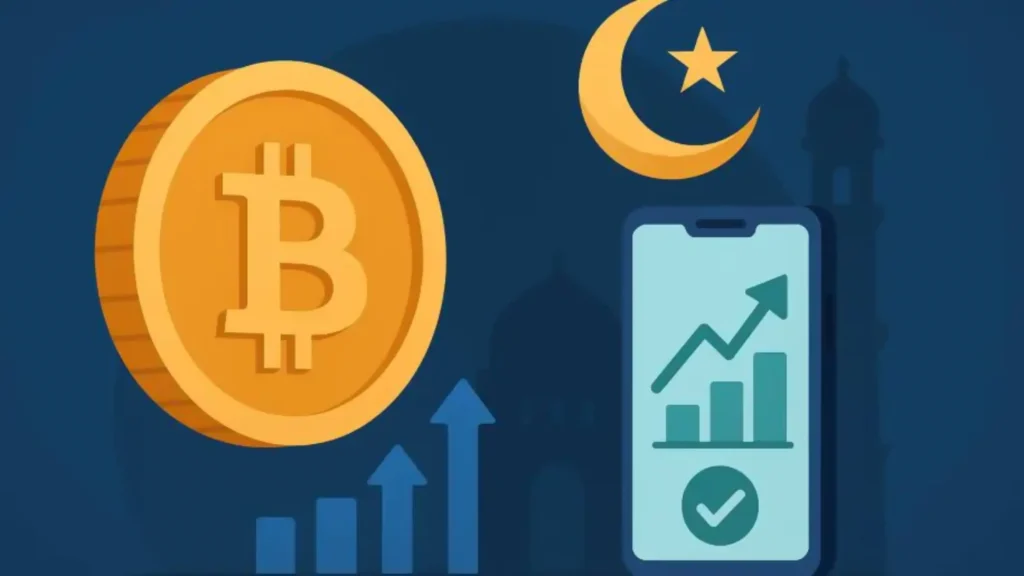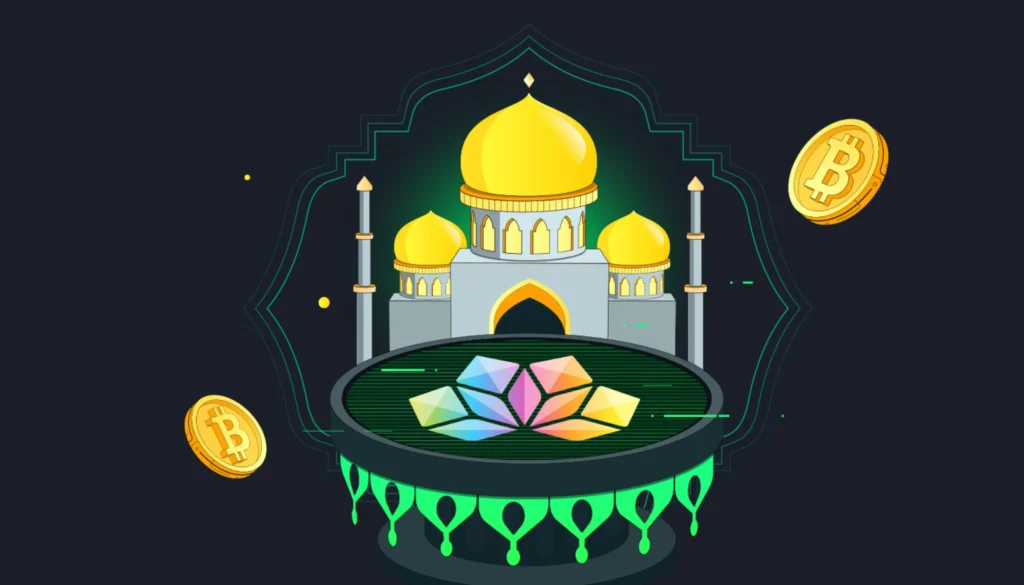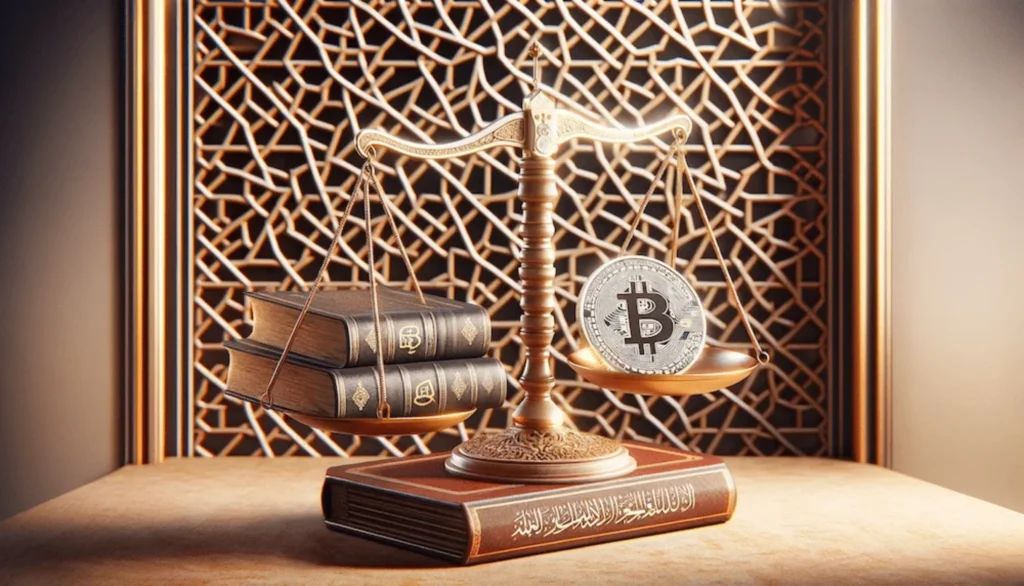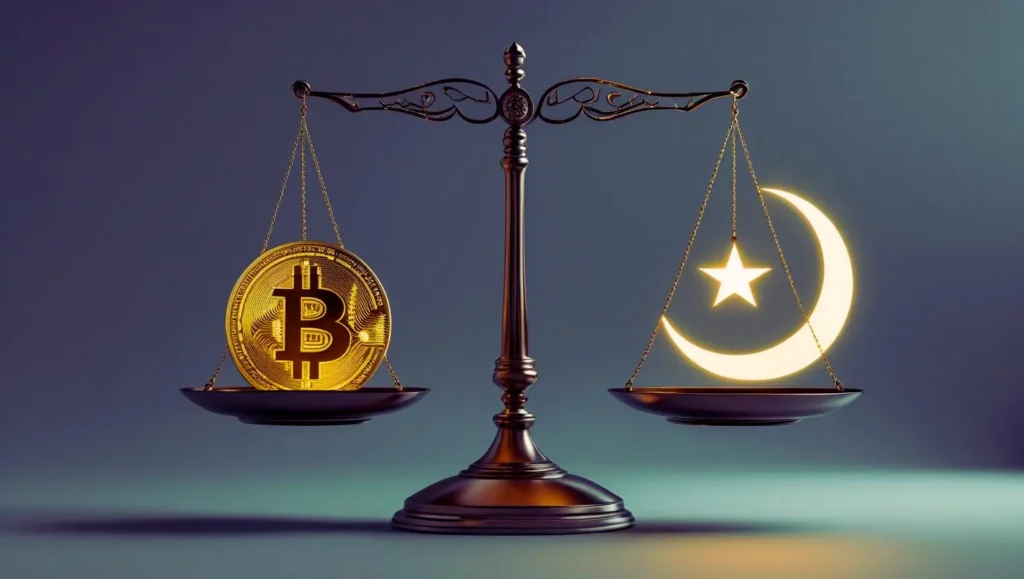Introduction:
The question is echoing everywhere lately: Is Cryptocurrency Halal or Haram? Islam’s View on Cryptocurrency has become one of the most talked-about topics across the Muslim world. Let’s be real for a second—crypto isn’t just some techy thing trending in Silicon Valley. It’s right here in our WhatsApp groups, dinner table convos, and late-night masjid debates. You’ll hear one uncle calling it a scam, some young guy calling it the future, and then someone quietly asking, “But wait… isn’t it haram?”
That question—Halal or haram? —has become the big one for Muslims navigating this new digital frontier.
Why? Because we don’t just care about making money—we care about how we make it. We’re raised to think about barakah, to avoid riba, and to stay far away from anything doubtful. So yeah, when something new like crypto shows up, of course we pause. And that pause? That’s taqwa, not weakness.
But here’s the thing… crypto’s not going away. From Bitcoin to NFTs to DeFi apps—it’s shaping our financial future. And we, as Muslims, are a part of that future. So instead of staying silent or scared, let’s look at it head-on—with sincerity, with curiosity, and most importantly, with iman.
This article won’t give you a fatwa. But it will give your perspective. We’ll walk through both sides of the Islamic crypto debate—halal and haram—based on what scholars say, what values Islam promotes, and how you can make choices that feel right both for your dunya and your akhirah.
No fearmongering. No crypto hype. Just a balanced, faith-first exploration.
What is Cryptocurrency?
Okay, confession time: most of us pretend we understand blockchain when we actually don’t.
So, let’s simplify. Cryptocurrency is digital money that lives on a tech system called blockchain. Think of blockchain like a giant, secure Google Sheet that tracks every transaction, and once something is recorded on it—boom—it’s there forever. No one can secretly change it.
The cool part? It’s decentralized, meaning no single bank or government controls it. You can send crypto to someone in another country in minutes—without involving any bank. It’s fast, global, and kind of… wild.
But yeah, there are risks. Crypto is volatile. It can shoot up in value or crash within hours. And let’s not even start on the number of scams floating around.
Also, crypto is bigger than just coins like Bitcoin or Ethereum. Blockchain tech is used in gaming, finance, art (hi, NFTs), and even real estate. So, when Muslims ask, “Is crypto halal or haram?” they’re really asking: Does this whole digital money world line up with Islamic values?
And honestly, that’s a good question.
Note : To understand the basics first, check out our detailed guide on what cryptocurrency is and how it works.
What Does Islam Say About Money and Trade?
Islam doesn’t just ask us to be wealthy—it asks us to be ethically wealthy.
In our faith, money is an Amanah (a trust). The Prophet Muhammad ﷺ emphasized honesty, transparency, and fairness in trade. So, when something new comes along—like crypto—we have to see if it fits these core principles.
Here are the big three no-go areas in Islamic finance:
- Riba (interest): Totally haram. Fixed-interest loans, savings accounts with interest—off-limits.
- Maisir (gambling): Also, haram. Anything that’s just chance-based profit without real effort or value.
- Gharar (excessive uncertainty): Islam likes clarity, not confusion. Deals should be fair, not shady.
Now apply that to crypto. It’s:
- Highly speculative (maisir? Maybe)
- Super volatile (gharar? Kind of)
- And unregulated (no Islamic checks, mostly)
But it’s not that simple. Islam allows profit with risk—as long as it’s honest and fair. Business investments, partnerships, ethical ventures—they’re all good. So crypto? It’s complicated.
Let’s look at the scholars’ concerns first.

Arguments for Crypto Being Haram
Alright… if you’re already into crypto, this part might sting a bit.
Some Islamic scholars have serious concerns about crypto, and it’s not because they’re “anti-tech.” It’s because they care about justice and accountability—two huge Islamic values.
Speculation
A lot of crypto trading is just guessing. Buy low, sell high, hope it moons. That’s very close to maisir—gambling—and Islam doesn’t allow money made through pure chance.
Volatility
One tweet from Elon Musk and boom—prices skyrocket or crash. This uncertainty feels a lot like gharar. And Islam encourages clear, stable transactions.
Criminal Activity
Unfortunately, crypto has been used for shady stuff—money laundering, scams, darknet trades. Even if you’re not involved, some scholars say supporting a system that enables this can still be problematic.
No Intrinsic Value
Unlike gold or real estate, many cryptocurrencies don’t have physical or inherent value. Some scholars argue: if it’s worth is based only on hype or belief—is that even real?
Because of these points, some scholars—especially in Egypt, Turkey, and conservative circles—have ruled that Cryptocurrency Halal or Haram or doubtful. Their stance? Better to avoid until there’s more regulation and clarity.
But that’s just one side of the story…
Quick Comparison – Cryptocurrency Halal or Haram Concerns
| Concern | Why It Might Be Haram | Halal Counterpoint |
| Speculation (Maisir) | Many traders gamble on price spikes | If you invest with research and clear intention, it’s not gambling |
| Volatility (Gharar) | Prices can crash fast; it’s unstable | Business always has risk—Islam allows fair risk |
| Riba (Interest) | Some platforms pay guaranteed staking returns | Avoid interest-based schemes and use halal models |
| Illicit Use | Used in scams, darknet, fraud | Bitcoin itself isn’t haram—misuse doesn’t define the tech |
| No Intrinsic Value | Some coins have no real utility | Halal coins or asset-backed tokens are emerging |
Note: Not every coin or platform is the same—context really matters.
Arguments for Crypto Being Halal
Good news: there are also scholars who believe crypto can be halal—if it’s approached the right way.
And no, they’re not just crypto bros with fatwa dreams. These are serious scholars who get both Islamic jurisprudence and modern finance.
Real Asset Ownership
Bitcoin isn’t fake money. It’s a scarce digital asset, and when you own it, you own it—just like gold or land. That’s not riba, and it’s not gambling. It’s value-based ownership.
Transparency + Shared Risk
Blockchain offers clear records, and crypto often involves mutual risk—both values promoted in Islamic finance.
Ethical Usage
If you’re not gambling or getting into shady platforms—and you’re using crypto to build ethical wealth? That’s potentially halal. Your niyyah matters.
Islamic Crypto Projects
There are now Shariah-compliant coins, decentralized zakat platforms, and halal investment networks using crypto. It’s not all chaos.
Scholars like Mufti Faraz Adam and institutions in Malaysia say: crypto is halal, conditionally. Avoid interest, avoid deception, avoid harm—and you’re likely on the right track.
Bottom line? Crypto isn’t haram by default. It depends on how you use it.

Crypto Use Cases and Their Shariah Alignment (Rough View)
| Use Case | Halal Potential | Notes |
| Bitcoin as payment | Likely Halal | If used ethically with fair exchange |
| DeFi lending with interest | Haram | Contains riba |
| Charity with crypto | Halal | Many zakat-friendly platforms exist |
| NFTs (art/games) | It depends | Watch for content and purpose |
| Staking with no risk | Not Halal | Guaranteed returns = interest |
| Halal crypto platforms | Promising | Projects like Haqq are emerging |
These aren’t rulings—just general direction based on scholarly concerns.
Navigating the Gray Area:
Let’s be honest—most of us are stuck somewhere in the middle. Not 100% sold. Not 100% against it. And that’s okay.
Islam has always acknowledged that some things aren’t black and white. When you feel unsure, you’re encouraged to:
- Ask questions
- Make dua
- Seek scholars who understand both deen and dunya
No one’s gonna judge you if you’re being thoughtful and sincere. That’s more Islamic than blindly copying someone else’s opinion on TikTok, right?
And if your heart still feels uneasy? It’s okay to walk away. That feeling might be your fitrah guiding you.

Tips for Using Crypto the Halal Way
If you decide to use crypto, here are a few ways to keep it within your values:
Research your coin: Avoid tokens linked to gambling, riba, or shady business models.
Avoid interest-based lending: Some platforms offer “staking rewards” that resemble interest. Be cautious.
Use Shariah-compliant tools: Platforms like Haqq are working toward faith-aligned investing.
Check your niyyah: Are you investing for growth—or chasing a high? Be honest with yourself.
And maybe this goes without saying—but don’t invest money you can’t afford to lose. That’s just smart. Islam encourages stewardship, not recklessness.
Red Flags to Avoid in Crypto (for Halal-Conscious Investors)
| Red Flag | Why It’s a Problem in Islam |
| Coins linked to gambling | Violates prohibition on maisir |
| Platforms offering fixed interest | That’s riba, 100% haram |
| Meme coins with no real use | Could be deception or wasteful (not ethical investing) |
| Schemes that promise “guaranteed profits” | Very close to gambling or fraud |
| Investing blindly or on hype | Ignoring intention and ethical awareness |
Try to ask yourself before investing: “Would I feel good about this in front of Allah?”
Conclusion:
In the end, Cryptocurrency Halal or Haram? Islam’s View on Cryptocurrency is a question that doesn’t have a universal fatwa—but it does deserve your sincere reflection and intention.
So… Is cryptocurrency halal or haram?
The truth is, it depends. On your intention. Your knowledge. And your actions.
Islam isn’t here to make life harder—it’s here to guide us. And as long as we’re trying our best to be ethical, sincere, and informed, we’re on the right path—even if we trip along the way.
Crypto might be the future of money. But your akhirah is the future of everything. So, take your time. Ask real questions. And when in doubt? Choose what keeps your heart at peace.
Even if your wallet’s full of coins—make sure your soul stays light.
FAQs:
Q1: Is crypto haram in Islam?
A: Hmm… that depends. Some scholars say yes—mainly because of the speculation, crazy volatility, and ties to shady stuff like scams or darknet stuff. But others say if you use it ethically and avoid riba and gambling, it can be halal. It’s not a black-and-white answer tbh.
Q2: What makes crypto potentially haram?
A: So, the main concerns are speculation (like gambling, or maisir), instability (called gharar), and lack of regulation. Also, some coins don’t have real value—so they feel “fake” or risky. Basically, if it feels like you’re just rolling the dice, it’s a red flag Islamically.
Q3: Can Muslims invest in Bitcoin or Ethereum?
A: Yeah, you can—but it depends on how you do it. If you’re just chasing price spikes or using shady platforms with interest, that’s risky. But if you’re doing your research, staying ethical, and checking your niyyah—then many scholars say it’s okay, inshaAllah.
Q4: Are there any halal crypto platforms?
A: Yup, they’re starting to pop up. Platforms like Haqq are trying to build Shariah-compliant ecosystems. Not all are fully approved yet, but it’s a start. Just… don’t assume something’s halal just because it says “Islamic” on the homepage. Do your homework.
Q5: What should I avoid to keep my crypto halal?
A: Great question. Avoid staking schemes that guarantee interest (riba), meme coins with zero real value, and anything tied to haram stuff—like gambling, adult content, or dodgy NFTs. Also, if your gut says “hmm this feels off,” trust it. That’s probably your taqwa kicking in.
Q6: What if I’m still unsure if it’s halal or not?
A: Totally valid. Honestly, most of us are in that same boat. If you’re unsure, ask a trusted scholar—preferably someone who gets both Islam and crypto. And make dua. Islam’s big on intention, so even if you mess up, your sincerity counts more than perfection.
Q: Can I pay zakat on crypto? Or do I even have to?
A: Good question — and yes, if your crypto has value and you’ve held it for a year, zakat does apply (2.5% usually). Scholars say it’s like any other asset. Just make sure to calculate the value based on the current market price at zakat time. Oh, and… maybe don’t forget to keep records.
Q8: Are NFTs haram or halal in Islam?
A: NFTs are a gray area too. Some scholars are okay with them if they have real value, like art or intellectual property. But if it’s just hype or tied to inappropriate stuff (which, yeah, happens a lot), then nope — better to stay away. Like, why pay $5,000 for a digital cat pic?
Q9: Can I use crypto to donate to Islamic charities?
A: Actually… yes! A lot of Islamic charities are starting to accept crypto now. Just make sure they’re legit and transparent. Using crypto for sadaqah or zakat can be a good thing — if you know where it’s going and if it aligns with Shariah.
Q10: What’s a Shariah-compliant crypto exactly?
A: It’s basically a crypto project that follows Islamic principles — no interest, no fraud, no sketchy business. Platforms like Haqq are working on this. But be careful: just because something says “Shariah-compliant” doesn’t mean it is. Always check who certified it.
Q11: What if I bought crypto not knowing it might be haram?
A: You’re not alone, seriously. A lot of people jumped in without realizing the risks. If you learn later that something wasn’t halal, just make tawbah, get rid of profits earned the wrong way (donate it, maybe), and try to move forward in a better direction. Allah sees your effort, not just your past mistakes.


